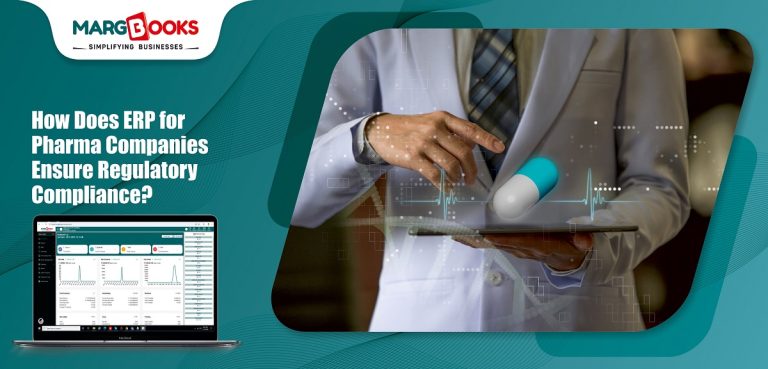The pharmaceutical industry is one of the most highly regulated sectors worldwide. With strict guidelines for manufacturing, distribution, and quality control, pharmaceutical companies must maintain impeccable standards to ensure safety, quality, and efficacy. One of the most powerful tools to help pharma companies stay compliant with these regulations is Enterprise Resource Planning (ERP) software. ERP for pharma companies streamlines processes, improves visibility, and provides a centralized platform for managing compliance requirements effectively.
In this blog, we’ll explore how ERP for pharma companies ensures regulatory compliance and why it’s crucial for businesses in this industry. We’ll also touch on how pharma distribution software and cloud-based pharma software are helping companies navigate the complex regulatory landscape.
The Need for Regulatory Compliance in the Pharmaceutical Industry
Pharmaceutical companies are subject to stringent regulations imposed by governing bodies such as Food and Drug Administration (FDA), the World Health Organization (WHO), the Drug Controller General of India (DCGI), and others. These regulations cover:
- Manufacturing standards
- Product safety
- Labeling and documentation
- Distribution processes
- Quality control and assurance
Failure to comply with these regulations can result in severe consequences, including product recalls, fines, legal issues, and damage to the company’s reputation. To stay ahead, companies need robust systems that ensure compliance across all levels of operations.
How ERP for Pharma Companies Improves Regulatory Compliance?
1. Centralized Data Management
An ERP system acts as a central hub for managing all business data. For pharma companies, this means that everything from manufacturing processes, quality control, and inventory management to sales and distribution is stored in one place. With real-time data visibility, it’s easier to track and ensure that all activities are aligned with regulatory requirements.
By consolidating data, ERP systems reduce the chances of errors, improve traceability, and enhance transparency, all of which are key for regulatory compliance.
2. Audit Trails and Documentation
One of the critical regulatory requirements in the pharmaceutical industry is maintaining thorough documentation for every step of the manufacturing and distribution process. ERP systems, especially those tailored for pharma companies, create automatic audit trails, capturing every action taken within the system. This means that each transaction, from procurement to production to distribution, is tracked.
These audit trails provide a clear and detailed history of all processes, which is essential during inspections or audits by regulatory authorities. They help demonstrate that all procedures were followed correctly and in compliance with applicable laws and standards.
3. Quality Control and Compliance Tracking
ERP for pharma companies includes features that help companies manage their quality control processes. This includes tracking raw materials, in-process goods, and finished products to ensure they meet the required standards before they reach the market.
- Batch and Lot Tracking: ERP systems allow for effective tracking of batches or lots of pharmaceutical products, ensuring that they comply with good manufacturing practices (GMP). This helps in quickly identifying any potential issues if a product fails to meet regulatory standards.
- Regulatory Alerts and Updates: ERP systems can integrate real-time updates regarding changes in regulatory requirements. Companies can receive alerts when laws or guidelines are modified, helping them adapt to new regulations without delay.
4. Inventory and Supply Chain Management
Pharmaceutical products are often subject to strict inventory management and distribution regulations. For instance, medications must be stored and transported under specific conditions. ERP systems for pharma companies integrate inventory management with regulatory standards, ensuring that drugs are stored, handled, and distributed in compliance with local and international laws.
- Temperature and Humidity Control: In the case of sensitive drugs, the ERP system can help track environmental conditions like temperature and humidity during storage and transportation.
- Inventory Replenishment and Control: The system ensures that pharmaceutical companies can maintain stock levels that comply with both demand and regulatory safety limits.
5. Integration with Pharma Distribution Software
Pharmaceutical distribution is a crucial part of regulatory compliance. Efficient and compliant distribution ensures that drugs reach the end users safely and without disruption. Pharma distribution software integrated into the ERP system helps manage the entire distribution chain.
The key benefits of this integration include:
- Tracking of Distribution Routes: ERP systems ensure that all routes taken by products are logged, ensuring compliance with transportation laws.
- Order Management: Automated order processing ensures that every order follows the legal processes, from sales to delivery, and complies with all relevant regulations.
By connecting the entire distribution network into the ERP system, pharma companies can better ensure that their products are always compliant with the applicable laws and regulations.
6. Cloud-Based Pharma Software for Remote Compliance Management
As the pharmaceutical industry continues to evolve, cloud technology is transforming how companies manage their operations. Cloud-based pharma software offers numerous advantages in ensuring regulatory compliance:
- Remote Accessibility: Cloud-based ERP solutions allow employees to access data and systems from any location, enabling better oversight and management of compliance tasks, especially for global pharma companies.
- Data Security: With cloud-based solutions, data is often encrypted and backed up securely, which is essential for safeguarding sensitive information required by regulatory authorities.
- Scalability: As pharma companies expand, cloud solutions scale with them, providing continuous compliance support without the need for complex IT infrastructure updates.
7. Automated Compliance Reporting
Reporting is a critical component of pharmaceutical compliance. Whether it’s submitting data to regulatory bodies or conducting internal audits, reports must be accurate and timely. ERP systems automate the generation of compliance reports, ensuring that all necessary information is ready when needed.
- Customizable Reports: ERP for pharma companies allows for customizable reports tailored to different regulatory requirements.
- Time-Saving Automation: Automating the reporting process saves time and reduces the risk of human error, ensuring accuracy and consistency across all reports.
The Future of ERP for Pharma Companies
As the pharmaceutical industry continues to face increasing regulatory pressures, ERP systems will play an even more significant role in helping businesses stay compliant. With advancements in cloud technology, artificial intelligence (AI), and machine learning, ERP solutions will become even smarter, offering predictive analytics, increased data security, and real-time insights into compliance status.
Furthermore, the integration of cloud-based pharma software will continue to transform the way companies operate, offering flexibility, scalability, and enhanced collaboration across teams.
Conclusion
In conclusion, ERP for pharma companies is not just about improving efficiency and reducing costs – it’s also a critical tool for ensuring regulatory compliance. By offering centralized data management, automated documentation, quality control, inventory management, and integration with pharma distribution software, ERP systems help pharmaceutical companies meet the stringent requirements set by regulatory bodies.
For Indian pharma companies aiming to stay ahead in this highly regulated industry, partnering with a trusted ERP provider like Margbooks can provide the necessary tools to maintain compliance and boost operational efficiency. With Margbooks’ ERP solutions, companies can ensure that their manufacturing, distribution, and quality assurance processes are always in line with the latest regulatory guidelines, safeguarding both their business and their customers.




